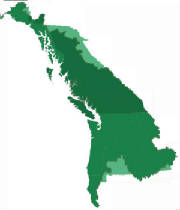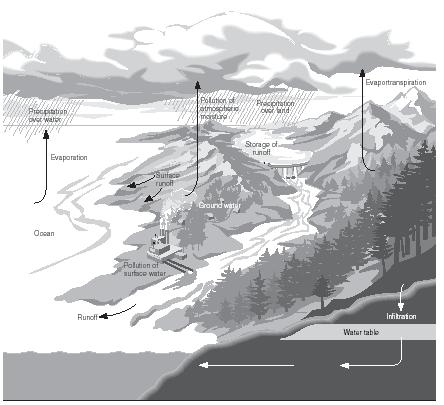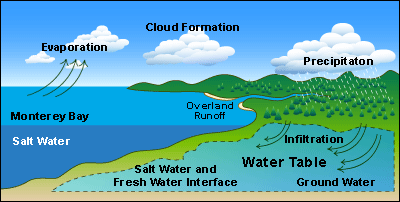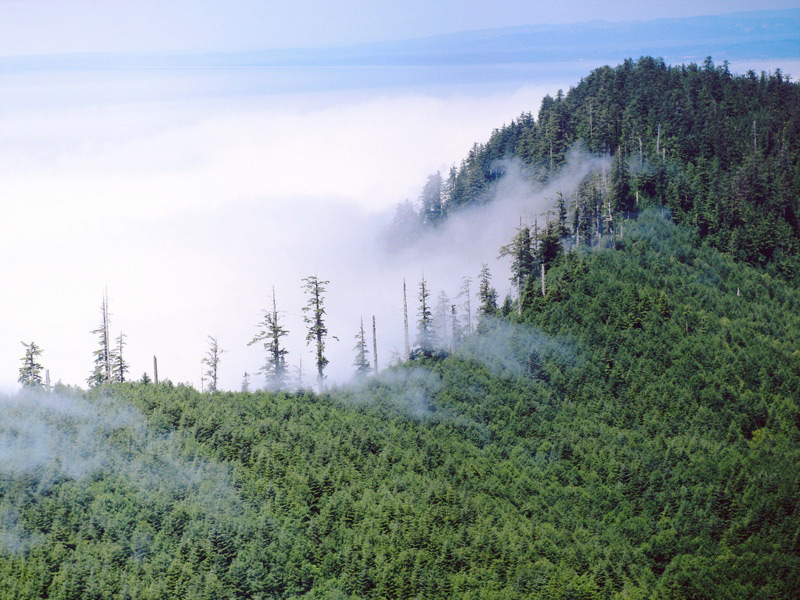|

Cascadia is that land and thought at the edge of the worlds. Some have called Cascadia a "state of mind" while others
point out that Cascadia is a real place defined by its geology, biodiversity and shared communities. Cascadia does often appear
as the eternal Terra Incognito (the land of the unknown) that is shrouded in mystery just outside of the mind and geography,
but it is that sense of mystique that makes Cascadia such a unique and real place.

Nestled between the North Pacific Ocean and the Continental Divide of the North American Continent lays a complex
region formed from ongoing geological events and continuous climatic factors. Several regional mountain ranges catch the moisture
of the Pacific as it passes on its way east. The Columbia, the Willamette and the Frazer rivers with their contributaries
and other riparian systems cut through the basalt and granite mountains of this region providing rich alluvium soil. The region
can be defined by this great water cycle that is powered and fed back into the Pacific Ocean. All the regional rivers, streams
and creeks eventually flow back towards the Pacific. The region's farthest eastern frontiers lay on the western slopes of
the Rocky Mountains where the spring melt begins its return to the Pacific. This is a region rich in biodiversity, history
and cultures. It is a land that is shaped by geologic, oceanic, climatic and perceptional forces.


Today sociologists, geographers and ecologists are redefining regions based on the commonality of the ecological
systems and the human interactions within geographic systems called bioregions. The North Eastern Pacific east to the continetal
divide is called Cascadia. The Cascadian bioregion encompassing the territories of the Alaskan Panhandle, British Columbia,
Idaho, Washington, Oregon, northern California and western Montana as well as very small portions of other near by states
and provinces. Cascadia is geographically the Columbia River Watershed and the area around the Cascade Range. Cascadia's farthest
extent is from northern California to the Alaskan Panhandle and from the Pacific to the Continental Divide.
This area has had many names over many years. Called the "Pacific NorthWest" from those who cartographic orientation
is from an Atlantic centered map. The Oregon Country by Anglo-Americans crossing the North American continent. Ecotopia by
utopians who love the idea of an ecologically centered worldview.
In Chinook Jargon (Chinuk Wawa) this region is called "Chinook Ilahaee" which means "land of the Chinook
speakers" and now perfectly matches the demarcated "borders" of the bioregion called Cascadia (which in Chinook
Jargon would translate as "Tumchuck Ilahee"). J.M.R. Le Jeune's "Chinook Rudiments" published on May 3rd
1924 describes the geographical placement of the use of Chinook Jargon and a partial glimpse of the demographics of who were
the Chinook Jargon speakers of the time:
"Chinook, for a century the International Language of the Pacific Coast, from Northern California to Alaska, from
the Pacific Ocean to the Rocky Mountains."
"Gradually took shape between 1790 and 1810, becoming t(h)e necessary means of intercourse between natives of twenty-seven
different tribes speaking as many different langauges, as well as between natives, whites and orientals."
The Scottish naturalist David Douglas named the Cascade mountain range after the powerful waterfalls that carved out this
land and gave it so much biomass. The name has been used as the name of a small town in Oregon founded in 1898. During the
Great Depression the US government created a jobs program and public projects under the Civilian Conservation Corp that created
a style of archecture called "Cascadian style" named for the region such monumental structures where built. In the
field of geology "Cascadian" has also came to be the name of the subduction zone off the Cascadian coastline.
The region as a whole has been called Oregon. Historically the whole Pacific NorthWest was the "Oregon Country"
and then became the "Oregon Territory" as it was annexed into the Atlantic Empires of Canada and the United States
of America. Eventually the name Oregon has been widdled down to one current political entity south of the Columbia River and
north of California. Some theories suggest that the name "Oregon" maybe be for the great river west of the continental
divide. A river that some Europeans thought maybe actually a "Northwest Passage" connecting the North Atlantic with
the Pacific Ocean. Some historians believe that "Oregon" was a name for the Columbia River dating back to 1765 in
written accounts from the English Army officer Major Robert Rogers. Rogers' verion of the Columbia was the Ouragon or Ourigan
River in a failed written petition in London to explore the region of the Ouragon. Some have believe this was a mistake confusing
the Ouisconsink (Wisconsin River) with the Columbia. A few historians believe "Ouragon" is from the French word
for hurricane or storm. Some historians claim "Oregon" comes from the Spanish words of oregano, oreja, and orejon
or from the French word Aragon. Other theories claim it is a name from Native people east of the Rockies.
In the mid 1970s Ernest Callenbach envisioned an emergence of environmental awareness that would lead the Pacific NorthWest
to form the country of Ecotopia. In the 1990s David McCloskey formed the Cascadia Institute. McCloskey describes Cascadia
as "a land of falling water".

|